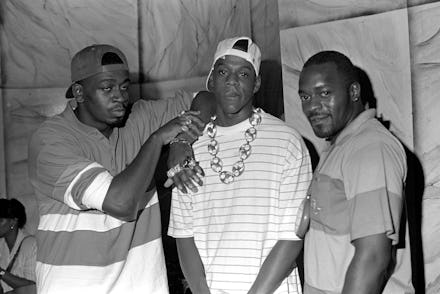Jay Z breaks down how blockchain could be the key to artist empowerment

The same artist who once said "fuck hastags and retweets" because of how he's respected in real life is now looking to upend the entire music industry with the very man who changed the world with those same hashtags and retweets. After Twitter CEO Jack Dorsey's financial payment system company Square purchased Jay-Z's streaming service Tidal for $300 million, the new business partners held a sort of virtual town hall on Twitter's new Clubhouse alternative Twitter Spaces. Outside the surrealism of the billionaire model of perpetual cool touting his playlist creation prowess, Jay's chat with Dorsey revealed Jay's thoughts on what he feels is the technology that can change the way artists are compensated: blockchain.
Jay elucidated blockchain technology's potential help for artists by breaking down how a 1982 painting from the late Jean-Michal Basquiat could go from being purchased from $2,500 in the '80s to resold for an obscene $110 million in 2017 to a Japanese billionaire without anyone in Basquiat's family receiving any profits. Blockchain may be technologically complex, but Jay sees a way to fix bad contracts by literally replacing them with smarter ones.
"With these blockchains and smart contracts, you can write the contract today to say 'Any sale that happens, I want to receive 50% on the first [sale], 40% on the next [sale]. There are so many creative ways you can participate and let others participate," Jay explained. "It's transparent, so there isn't any hiding behind any fancy words, lawyers or et cetra."
He later clarified he's not anti-labels or anti anything really, he's just "pro-artists." But, it's clear his main attraction to blockchain is to disrupt the traditional recording industry that sees record labels receiving the lion's share of the profit of an artist's blood, sweat, and tears. You don't need to go any further than Jay-Z's classic Kanye West-produced song "Izzo (H.O.V.A.)" from 2001's The Blueprint to understand how blockchain technology is perfect for the future for the music industry Jay-Z has been building for decades:
"Industry shady; it needs to be taken over/
Label owners hate me; I'm raisin' the status quo up /
I'm overchargin' niggaz for what they did to the Cold Crush /
Pay us like you owe us for all the years that you hoe'd us."
Near the end, he's referencing The Cold Crush Brothers, a pioneering hip-hop group from the '70s. One of its members, Grandmaster Caz, wrote on Sugar Hill Gang's "Rapper's Delight," the first Hip-Hop song to land on the Billboard Top 40 charts, yet was never compensated or credited for his work on arguably the most important hip-hop song of all time. With smart contracts, Caz could've sold the lyrics with paperwork that stipulated he received a portion of any sale of the music using his lyrics, which after 40+ years, would've possibly resulted in tens of millions of dollars.
Jay chatting with Dorsey and selling Tidal to him as well, are emblems of the shift in financial agency of hip-hop artists. Rappers not only know their worth now, they're keeping most of it for themselves by venturing into disruptive technology. Nas has probably made more money from technology in the last few years than he ever did from 25+ years of releasing music thanks to early investments in security camera company Ring and cryptocurrency exchange platform Coinbase. After Amazon purchased Ring in 2018 for $1 billion and Coinbase went public on the stock market earlier this year, Nas reportedly netted anywhere from $80 million to $140 million combined. No matter your opinion on the successful investor calling himself "cryptocurrency Scarface" on his Jay-Z collaboration "Sorry Not Sorry" from DJ Khaled's Khaled Khaled album, it marries the street entrepreneurialism that founded hip-hop and the legitimate corporate takeover hip-hop is on the precipice of running in the future.
With rappers Snoop Dogg, Curren$y, and Jay-Z himself releasing non fungible tokens (NFTs) in the last few months, the very technology him and Jack were opening eyes up to on Twitter could soon become the standard for the world.